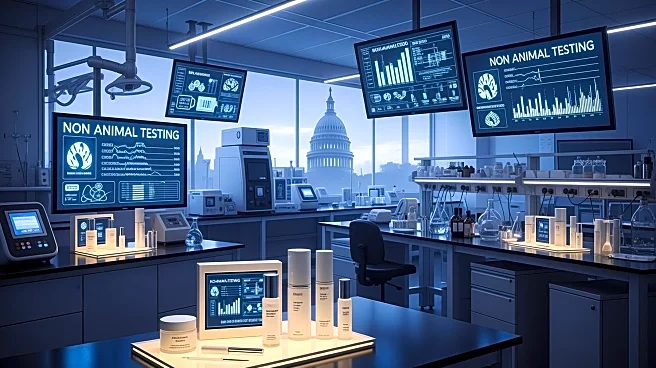What's Happening?
Industry leaders from the U.S. cosmetics and personal care sector recently gathered on Capitol Hill to discuss key policy priorities with lawmakers. The event, organized by the Personal Care Products Council
(PCPC), focused on several legislative issues, including the reauthorization of the Over-the-Counter Monograph User Fee Act (OMUFA), implementation of the Modernization of Cosmetics Regulation Act (MoCRA), expansion of non-animal testing methods, and tariff relief. Karin Ross, executive vice president of government affairs at PCPC, highlighted the importance of modernizing the FDA's sunscreen review process and adopting non-animal testing methods for safety evaluations. The industry is also closely monitoring upcoming rulemakings under MoCRA, with a focus on fragrance allergens and Good Manufacturing Practices. Additionally, the PCPC is advocating for tariff relief to protect jobs and preserve domestic operations, while emphasizing the significance of the U.S.-Mexico-Canada Agreement (USMCA) for future trade deals.
Why It's Important?
The discussions on Capitol Hill are crucial for the U.S. beauty industry as they address regulatory and economic challenges that could impact the sector's growth and competitiveness. The push for non-animal testing methods aligns with global trends and could lead to more humane and scientifically advanced safety assessments. Modernizing the FDA's sunscreen review process and expanding consumer access to OTC drugs are expected to benefit both manufacturers and consumers. Tariff relief efforts aim to mitigate supply chain pressures and support domestic production, which is vital for maintaining jobs and innovation within the industry. The advocacy for a unified regulatory framework under MoCRA is essential to prevent a patchwork of conflicting state-level regulations that could complicate compliance and disrupt business operations.
What's Next?
The beauty industry will continue to engage with lawmakers to ensure the successful implementation of MoCRA and the reauthorization of OMUFA. Companies are preparing for upcoming deadlines related to fragrance allergens and Good Manufacturing Practices, while seeking clear guidance from the FDA. The industry is also advocating for the passage of the Humane Cosmetics Act, which would align U.S. regulations with international standards on non-animal testing. As tariff relief discussions progress, the PCPC will focus on protecting jobs and preserving domestic operations. The industry will also monitor state-level regulatory developments to address potential conflicts with federal law.
Beyond the Headlines
The push for non-animal testing methods reflects broader ethical considerations within the beauty industry, as companies seek to align with international standards and consumer expectations for cruelty-free products. The emphasis on regulatory consistency highlights the industry's need for a stable and predictable business environment to foster innovation and growth. The advocacy for tariff relief underscores the importance of maintaining competitive manufacturing operations in the U.S., which is crucial for sustaining economic contributions and job creation. The industry's engagement with lawmakers demonstrates its proactive approach to shaping policies that support its long-term sustainability and global competitiveness.








